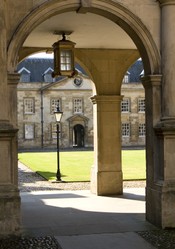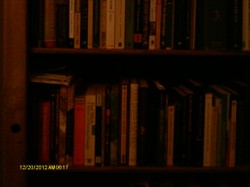The spectre at the feast is an ancient literary theme that is present in Macbeth, when the murderous king is confronted by Banquo's ghost, which only he can see. We are often told that Macbeth's guests would think him mad for seeing the spectre, but not so! Shakespeare does not tell us what the guests thought, but in a land where such phenomena are widely accepted, they would have taken it seriously [had it happened, which it did not.] There is a similar tale in the Book of Daniel when King Belshazzar is feasting, only to see an angelic hand write words portending his doom on the wall. The same theme occurs in the tale of Gawain and the Green Knight, when an unslayable spectre challenges King Arthur's knights to behead him, only to find that the head springs back onto his shoulders.
The whole thrust of this ancient literary theme is that at occasions celebrating power and status, when the great and/or wise of this world assemble to rejoice and feast, confident in the security of their position, the reality that the Irish called the Other might erupt into their complacency and shake them. This is what happened one night in December 1997, when something that should not have happened did occur, and none could easily and comfortably explain it. The assembled dons included expert scientists, philosophers, historians and theologians, several of whom were in contention for Nobel prizes, but in a room behind the feast some waiters were experiencing something that should not have happened.
Peterhouse college sits close to the shallow and winding Cam, whose December mists float over its ancient spires. Like all Oxford and Cambridge colleges it is a place of ritual, where the dons meet at celebratory feasts and dine on good food and fine wine, all on beautiful china plates. There are strict rules of order, for none is expected to leave the table before the Master has done so, but this night the dean, an Anglican clergyman was summoned, by a worried butler. For the first time someone left the table when the master was speaking, knowing that something urgent had occurred and mouthing apologies to the Master.
Hurrying down to the Combination Room, one of the most ancient parts of the college, the Reverend dean was confronted by the sight of smashed china and two very frightened servants.
"Tell the Dean what you saw." the butler commanded.
The men reported that they had been preparing to serve dinner when a figure simply materialized, crossed the room and disappeared by a window. There was also a knocking sound from behind the fireplace. One man said that the figure had walked, the other claimed that it had floated, but both concurred that it had a face. They were hoping that the Reverend dean could explain to them what had happened. It was noteworthy that it was to the dean they turned, a clergyman rather than to one of the several eminent scientists at the feast, for they had that deeply founded intuition that at times you must turn to religion.
There is a range of responses. For some it was a nine day wonder and they shrugged and got on with their lives, but for the Dean, Graham Ward, it prompted reflection which continued even when he was promoted away from Peterhouse to become Regius professor of Divinity at Oxford, a position for which you do not apply, but which is within the gift of the monarch, for it is the Anglican Church's senior theologian. The fruits of this reflection stimulated his writing of the book, Unbelievable, which inquires into the nature of belief. It is a profound and challenging work displaying a masterful command of religion, psychology, philosophy and history.







 Darkness over the Earth the skies darkened when Jesus was crucified23 days ago
Darkness over the Earth the skies darkened when Jesus was crucified23 days ago
 TheThousand Year Gardenon 11/26/2025
TheThousand Year Gardenon 11/26/2025
 Women of the Gospelson 10/11/2025
Women of the Gospelson 10/11/2025
 Religious Gardenson 08/25/2025
Religious Gardenson 08/25/2025




Comments
I don't think that they always have faces. Some are shapeless wraiths.
The sixth paragraph to the first subheading, When the other comes a-calling, advises us that "One man said that the figure had walked, the other claimed that it had floated, but both concurred that it had a face."
Do ghosts not always have faces?
It is a lifetime appointment.
The last paragraph to the first subheading, When the other comes a-calling, contains the reference to the "Regius professor of Divinity at Oxford, a position for which you do not apply, but which is within the gift of the monarch, for it is the Anglican Church's senior theologian."
Is the Regius professorship an appointment until death or disability? Or might it be reviewed annually or even subject to rescindability?
I cannot decide on how ghosts communicate, sorry. A suicide is always a tragedy rather than an evil being.
The fourth paragraph to your second subheading, A cacophony of responses, bears the information that "Some tentatively linked the ghost with a college official who committed suicide three hundred years ago, and they noted that the window by which the ghost had disappeared might once have been the door to a garden."
That's why I considered whether the knocking could be a proto-Morse Code-like form of communication.
Is a suicide considered a bad or good ghost?
Would not goodness mean that that ghost could anticipate a Morse Code-like communication before humans do?
No one recorded the knocks. I doubt that it was Morse, as Morse is an agreed socially constructed system that has to be learned.
It's interesting that there's so much knocking in regard to the Peterhouse Ghost.
Would anyone have recorded the number of knocks in an attempt to break some sound code? Would it be possible that it was Morse Code before there was Morse Code?!
I believe that the most productive attitude to the paranormal is the phenomenological approach, which approaches strange phenomena with suspended judgment. Thus,when someone tells me something strange has hapened that does not fit into my world-view, I don't write it off straight away as wrong, but I bracket the judgment to enable me to examine the arguments and evidence for it. Thus, when we speak of ghosts, my response is not to summarily declare "I don't believe in ghosts." but to look objectively at the phenomenon reported to me. The correct strategy is therefore to accept the phenomenon but not necessarily the explanation that someone gives for it.
Fascinating - I had not heard the story of the Peterhouse Ghost before. Your analysis is also excellent - respectful and thought provoking. I also like the way you conclude with we do not understand everything and therefore cannot make a final conclusion about such phenomena. Indeed, to have the courage to change our view of reality when the evidence demands it is the right (and brave) thing to do.